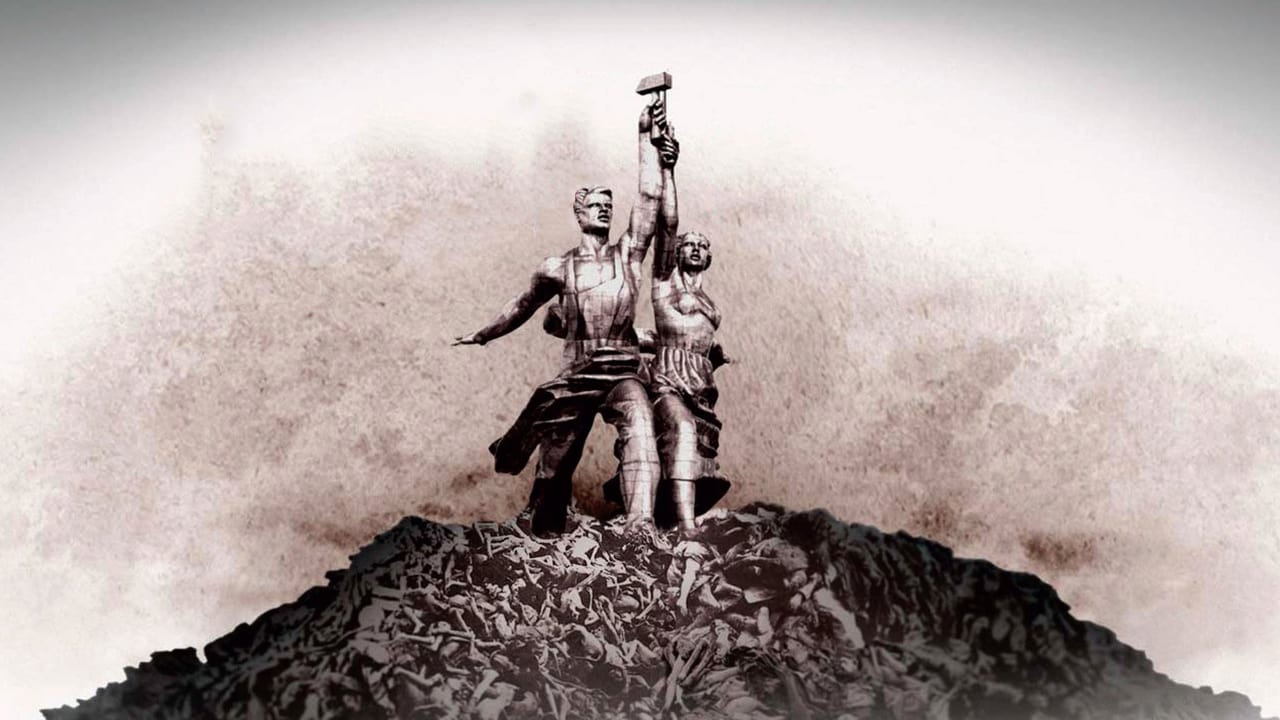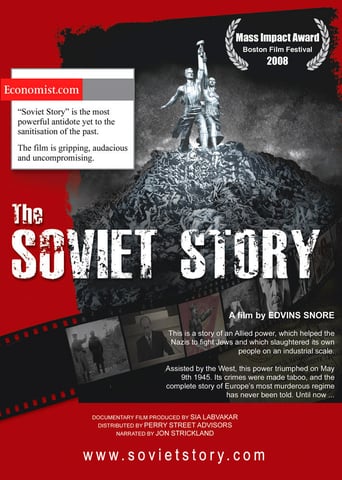



Very Cool!!!
Highly Overrated But Still Good
It is both painfully honest and laugh-out-loud funny at the same time.
View MoreIt's the kind of movie you'll want to see a second time with someone who hasn't seen it yet, to remember what it was like to watch it for the first time.
View MoreNever have I seen anything quite so stupid and puerile. It is complete propaganda, most of it so far-fetched as to be completely lacking in credibility to anyone with a modicum of knowledge of Soviet history. Complete rubbish.
View Morefilled with historical inaccuracies and falsehoods this film is not a documentary it is fiction with a few facts thrown in. It is a clear work of propaganda funded by the EU. It makes out that the Russians hated the Jews and ignores the fundamental differences between the Nazi's and soviets, for starters how the soviet backed communists where regularly attacked and killed in Germany by the Nazi's.
View MoreAn excellent review was written by G K.What should be mentioned is how many likes get negative reviews of this movie and how many "dont like" get critical ones.It is not surprising.There are three categories of people, into which all the people can be divided, those who are experts in Russian and European history, those who are either anti Russian or pro Russian, and the vast majority of people who do not care or do not know much about Russia.The movie targets primarily anti Russian and, what is more important, "do not care, do not know much" audience. The last one, that probably outnumbers other categories is the aim of the movie and its ideologists.Surely, after watching it you may say, oh, really Russians are guilty.. Now it is easy to understand why some dislike them. In that way, producers of the movie made a great job and payed back all the money that was put into the project.Well then, now ask yourself, can you really believe those "nice men" who were sponsored to film such a piece of art to sow the seeds of hatred among not well educated people towards Russia? Anyone can make a similar movie about any other country that IS or WAS an Empire, and ruled some part of the world. And, not being an expert on the subject, you will be shocked, if you are presented with distorted facts and manipulative comments.That is what this movie is for. It tries to explain, why some ex Soviet block countries live bad, even under the EU regime and why Russian people in the Baltic states like Latvia lack civil rights and are oppressed in every way. Democracy and equal rights there is not for everyone, but for some.So, why not make a movie about it? No need for falsification even, like in The Soviet Story, just film real people and what is happening today with Russians in Latvia, Lithuania, Estonia.Why such a movie may not be produced under current circumstances? Because there's a unipolar attitude toward Russia today, and that only can make you sober and critical towards artfully made propaganda like The "what you should believe as" Soviet Story.
View MoreOf thousands of films, books, and plays on the communist experience, this one stands out above all the rest — a monument to millions of innocent victims and a charge against a bloodthirsty socialist theory that killed almost two hundred million people in the 20th century and continues its murderous trail into the 21st.The film was directed by a talented Latvian producer Edvīns nore. In its synopsis nore writes: This is a story of an Allied power, which helped the Nazis to fight Jews and which slaughtered its own people on an industrial scale. Assisted by the West, this power triumphed on May 9th, 1945. Its crimes were made taboo, and the complete story of Europe's most murderous regime has never been told.The film argues that there were close philosophical, political, and military relations between Nazi Germany and the Soviet Union before and during the early stages of World War II. It highlights the Great Famine: the infamous "holodomor" which wiped out seven million Ukrainians, the Great Purge in Moscow and elsewhere in the USSR with over eleven million murdered, as well as the Katyn massacre of tens of thousands of Polish officers.The film sheds the light on Gestapo-NKVD collaboration in mass murder of Jews and German opposition, Soviet mass deportations, and inhuman medical experiments in the GULAG.The Economist praises the film by saying: "Soviet Story" is the most powerful antidote yet to the sanitisation of the past. The film is gripping, audacious and uncompromising. The main aim of the film is to show the close connections—philosophical, political and organisational—between the Nazi and Soviet systems Those who keep a soft spot for Marxism may flinch to hear that the sage of Highgate referred to backward societies as Völkerabfälle (racial trash) who must "perish in the revolutionary holocaust." Or that the Nazi party in its early days idolised Lenin (Josef Goebbels said he was second only to Adolf Hitler in greatness).This is a revelation for some. Ludwig Von Mises wrote about Nazism and communism as two forms of the same socialist tyranny for a long time. He analyzed "two patterns for the realization of socialism" when he wrote: The first pattern (we may call it the Lenin or the Russian pattern) is purely bureaucratic. All plants, shops and farms are formally nationalized (verstaatlicht); they are departments of the government operated by civil servants. Every unit of the apparatus of production stands in the same relation to the superior central organization, as does a local post office to the office of the postmaster general. The second pattern (we may call it the Hindenburg or German pattern) nominally and seemingly preserves private ownership of markets, prices, wages, and interest rates. There are, however, no longer entrepreneurs, but only shop managers (Betriebsfuhrer in the terminology of the Nazi legislation).Both systems, as Von Mises pointed out, were inevitably doomed to result in "barbarism," as they promptly did.The film features interviews with western and Russian historians such as Norman Davies and George Watson from Cambridge, Boris Sokolov, Russian writer Viktor Suvorov, Soviet dissident Vladimir Bukovsky, members of the European Parliament and the participants, as well as the victims of Soviet and Nazi terror.Eminent British literary historian George Watson proved in his research that Karl Marx is "the ancestor of the modern political genocide." Marx used the term "racial trash" (Völkerabfälle) in relation to a number of some European ethnicities who were left behind by economic progress and should be "disposed of." As former Soviet dissident (now a dissident again under the Putin regime) Vladimir Bukovsky explains: "When Communists come to power, it does not matter where, let it be in Russia, in Poland, in Cuba, in Nicaragua, in China, initially they destroy about ten percent of the population" in order to restructure the fabric of society. Then the "real work" begins with destruction of the designated target groups: priests, peasants, intellectuals, entrepreneurs, certain ethnicities – Ukrainians, Chechens, Jews, Crimean Tatars and others.The making of the film is timely as the FSB/KGB regime in Russia increasingly embraces its Stalinist roots. Joe Bendel of The Epoch Times, mentioned that producer Edvīns nore was burned in effigy by Neo-Soviet Russians for his in-depth survey of Soviet crimes against humanity: It is an ominous badge of honor. This film that you are not supposed to see in Putin's Russia tells us how the ultimate government inevitably becomes the ultimate evil. A couple of reviewers here tried to trash The Soviet Story as a propaganda movie. It is not. It is a very angry, but accurate film. Some footage, however, is somewhat repetitive. I can see why. Unlike their Nazi colleagues, Soviet mass murderers were trying to conceal their crimes and did not leave us many pictures or film about their crimes. Even officers in the Soviet Army were not permitted to own a camera. They could be shot as "spies" just for having one. Nazis, on the contrary, were proud of their crimes and left us with a lot of pictures and footage of their victims. I do not care how accurate is the episode with a wheel barrow cited in one of negative reviews. If Soviets murdered 40-60 million people of all nationalities wouldn't they occasionally toss some corpses from a train car? It is believable to me.I agree with reviewers that Mr. nore does not like the USSR and current Russian rulers. Should he? There is an ongoing hysterical campaign orchestrated from Kremlin against him, Latvia, Lithuania, Estonia, Poland and "historical revisionism" i.e. exposure of socialist criminal regimes.The Soviet Story is a must see for any friend of liberty. You can either watch The Soviet Story for free on YouTube or order a DVD from www.sovietstory.com.
View More